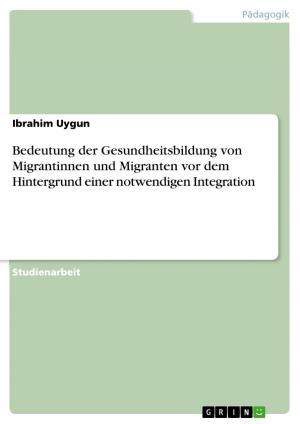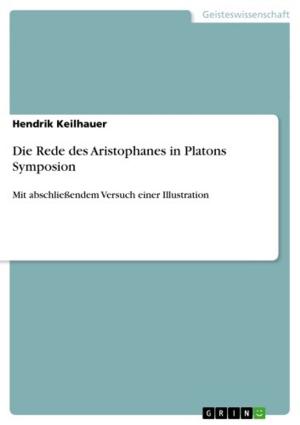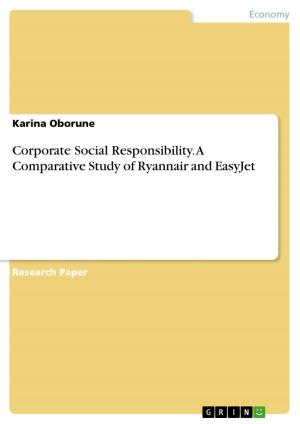| Author: | Eugen Stumpf | ISBN: | 9783656052470 |
| Publisher: | GRIN Verlag | Publication: | November 10, 2011 |
| Imprint: | GRIN Verlag | Language: | English |
| Author: | Eugen Stumpf |
| ISBN: | 9783656052470 |
| Publisher: | GRIN Verlag |
| Publication: | November 10, 2011 |
| Imprint: | GRIN Verlag |
| Language: | English |
Research Paper (undergraduate) from the year 2011 in the subject Business economics - Business Management, Corporate Governance, grade: 2,0, University of applied sciences, Düsseldorf, course: Soft Skills and Leadership, language: English, abstract: Executive Summary This assignment will provide a short overview about the GLOBE project and is based on different research in books, papers, master thesis and professorial dissertations. The Global Leadership and Organizational Behaviour Effectiveness Research Program has started in 1993 and continues until today. The aim of the GLOBE project was to develop societal and organisational measures of culture and leadership attributes that could be used across cultures (House, Hanges, Ruiz-Quintanilla, Dorfman, Javidan, Dickson, Gupta et al., 1999). Before starting the project a common understanding and definition of Leadership and Culture was achieved. GLOBE researchers agreed to define the LEADERSHIP: 'Leadership is the ability of an individual to influence, motivate and enable others to contribute towards effectiveness and success of the organizations of which they are members' (House et al. 2004; 15). The GLOBE team used the four leadership attributes developed by Geert Hofstede: uncertainty avoidance, masculinity femininity, individualism-collectivism, and more recently future orientation (Hofstede 1980, 1991) as a basic and developed nine leadership characteristics: Performance Orientation, Uncertainty Avoidance, Humane Orientation, Institutional Collectivism, In-Group Collectivism, Assertiveness, Gender Egalitarianism, Future Orientation, Power Distance. The cultural differences of attribute influences are analysed in the research project. The questionnaire is to be answered from middle mangers and white collar workers coming of the following industries: food processing, financial services, and telecommunications services. The research was split into four parts. As first step the two pilot projects was initiated in order to prepare the questionnaire and to test the stability of the analysis method. Based on the results seven hypotheses were developed and investigated in the second step. Both first steps are finished. Depending on confirmation of all seven hypotheses the implicit leadership theory has to be developed in the third phase of project. This third phase is in the process. The last part of project must test the theory items in laboratory and in the field. Some preliminary findings are shown at the end of this assignment.
Research Paper (undergraduate) from the year 2011 in the subject Business economics - Business Management, Corporate Governance, grade: 2,0, University of applied sciences, Düsseldorf, course: Soft Skills and Leadership, language: English, abstract: Executive Summary This assignment will provide a short overview about the GLOBE project and is based on different research in books, papers, master thesis and professorial dissertations. The Global Leadership and Organizational Behaviour Effectiveness Research Program has started in 1993 and continues until today. The aim of the GLOBE project was to develop societal and organisational measures of culture and leadership attributes that could be used across cultures (House, Hanges, Ruiz-Quintanilla, Dorfman, Javidan, Dickson, Gupta et al., 1999). Before starting the project a common understanding and definition of Leadership and Culture was achieved. GLOBE researchers agreed to define the LEADERSHIP: 'Leadership is the ability of an individual to influence, motivate and enable others to contribute towards effectiveness and success of the organizations of which they are members' (House et al. 2004; 15). The GLOBE team used the four leadership attributes developed by Geert Hofstede: uncertainty avoidance, masculinity femininity, individualism-collectivism, and more recently future orientation (Hofstede 1980, 1991) as a basic and developed nine leadership characteristics: Performance Orientation, Uncertainty Avoidance, Humane Orientation, Institutional Collectivism, In-Group Collectivism, Assertiveness, Gender Egalitarianism, Future Orientation, Power Distance. The cultural differences of attribute influences are analysed in the research project. The questionnaire is to be answered from middle mangers and white collar workers coming of the following industries: food processing, financial services, and telecommunications services. The research was split into four parts. As first step the two pilot projects was initiated in order to prepare the questionnaire and to test the stability of the analysis method. Based on the results seven hypotheses were developed and investigated in the second step. Both first steps are finished. Depending on confirmation of all seven hypotheses the implicit leadership theory has to be developed in the third phase of project. This third phase is in the process. The last part of project must test the theory items in laboratory and in the field. Some preliminary findings are shown at the end of this assignment.















